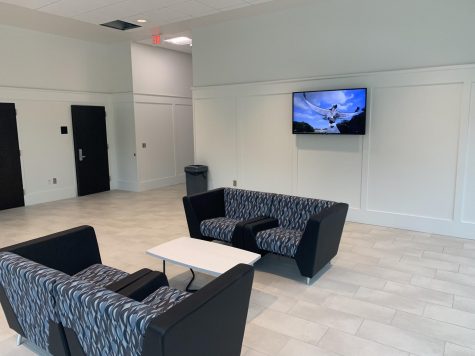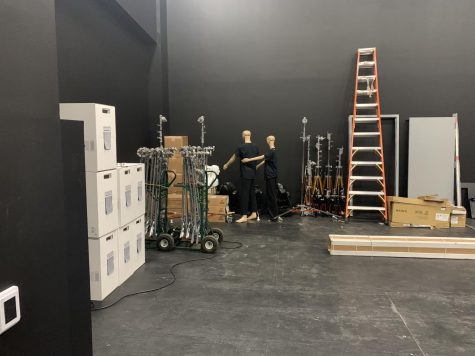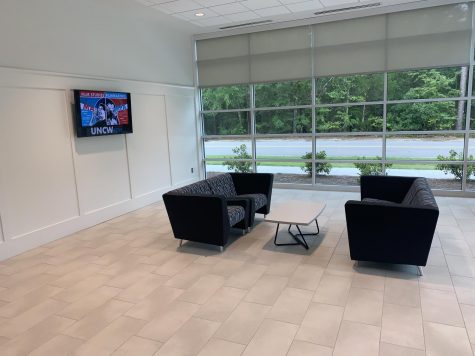Filmmakers, welcome to the new University Film Center
The film studies department at UNCW is defined by its sense of community and the deeply shared passion for the cinematic arts, whether it be the scholarly study of the medium or filmmaking itself. As the film department receives more students each year, and Wilmington’s film community continues to grow, the question that arises is how can the film department be a part of that growth?
That question is answered by the year-long construction and opening of the University Film Center on UNCW’s campus. The film department has hosted a majority of its courses in King Hall for its lecture courses, and Kenan Hall for production courses. The new University Film Center, located at 5259 Riegel Road on the south end of campus, combines the functions of the aforementioned buildings and expands the opportunities offered by the film department.

An interview with department chair Mariana Johnson, as well as email correspondences with film students, provided further insight and a sense of excitement for the center’s features. The general sense is that students will feel closer to the cinematic community than ever before.
The first noteworthy addition to the facility is the new equipment room. Previously located in Kenan Hall, the new equipment is three times the size of its predecessor and includes a wider range, such as state-of-the-art cameras, lighting kits and other accessories.
“Right now, all of the production courses that use film equipment are taught back here because all of our equipment lives back here,” said Johnson.

The equipment room itself is well-complemented by the construction of a brand-new sound stage. Measured to be 4,000 square feet, the studio will serve as a space for students to practice filmmaking and give life to their diverse range of ideas, which can come in the form of narrative productions, music videos, documentaries and much more. The space is also significant for its inclusion of a garage door, which allows large objects such as vehicles to be used for production. Many film students can look forward to this expansive space and the greater possibilities of what they can accomplish with their work.
The freedom offered by this studio is enough to encourage a shared excitement among those in the film major.
“I enjoy the new movie recording studio the most,” said senior Mark Ray.

Ray’s anticipation for the studio’s usage is met by that of senior Brett Dunlap.
“The new sound stage is still under construction, and this does impact some production classes. However, I’m looking forward to eventually being able to use the much-upgraded space,” said Dunlap.
On the other hand, a new state-of-the-art cinema has been developed with capabilities greater than the ones offered in King Hall’s theater, the most significant being its ability to play 16mm and digital films.
“The cinema will allow us to have classes for our students, who are screening films the way they’re supposed to be seen, in an intimate setting with their peers,” said Johnson. She believes the theater will be a serviceable venue for special events like student screenings hosted by the likes of UNCW’s own Cinematique and Flicker Film Society, as well as film festivals like Cucalorus.

The building’s aforementioned features are topped off with the inclusion of a new classroom and editing lab. Every room of the facility is dedicated to different aspects of film, such as the classroom’s use for scholarly study and the theater’s exhibition for films of cultural significance. Furthermore, the soundstage, equipment room and editing lab allow students to actually practice and accomplish filmmaking. Johnson notes that the proximity of each room is meant to create a space for filmmaking and film culture that will allow students to grow closer with each other.
“I feel like this new construction was UNCW’s way of acknowledging the film department and its students and all the hard work that has been done over the years. This upgrade makes me feel seen and important, which any student would want to feel from their university. I think it’s the step in the right direction, not only for the university but also for the community,” said senior Lilliane Hogsten.
The opportunities that arise from this new space benefit not only undergraduate students but also graduates enrolled in the film department’s MFA in filmmaking and MA in film studies. Students from both graduate programs built a community with each other through their interactions and collaboration on their own projects in the shared setting. After a year since the programs began, it’s the film department’s goal to become the most renowned university for graduate film programs in North Carolina.

While some courses like screenwriting and introduction to film studies aren’t taught at the new facility just yet, they could be at some point. The new building’s features are mostly aimed towards offering more for students to do to practice filmmaking. Even with the new building, all spaces occupied by the film department will remain in use and stay operational from 8 a.m. to 9 p.m. every day, except for Fridays.
The new facility will also form connections to the Wilmington community. “We do think that having this state-of-the-art facility will help us forge community partnerships because we want to be partners in the community, not just the film community, but the ways in which film can promote culture, social activism and nonprofit organizations here in town,” said Johnson.
The Film Center’s features and goals promise an immersive learning experience for all students with a passion for filmmaking and studying film.
“We’d like to expand back here [in the south end of campus] and really, really create a hub of filmmaking and film culture in which our students can connect to the community,” said Johnson.”








Francine DeCoursey • Sep 2, 2021 at 1:49 pm
As a 30 year Veteran of Wilmington’s Film industry,
I’m glad to hear some of our expert craftsmen and women may be able to play a role in this new facility
advancing an industry we helped build. Will there be an Opening Reception and tour of the building soon?